Susan Rooke's Blog
October 5, 2023
Hallelujah, October’s Here!
Hello, dear peeps! First, a huge thank-you to everyone who’s already ordered my new poetry chapbook, Of Stars & Smoke: poems for the dark wane of the year! I hope you’re enjoying the poems and I wish for you a Halloween full of delightful treats! I need to let you know that early bird specials are now over and normal pricing has taken effect, but the paperback is still a deal at $8.95, and the e-book is just $2.99. And I can’t tell you how much I appreciate your kindness and support in this endeavor!

I don’t typically make resolutions, but with the reduction in temperatures (small and gradual, but I’ll take it), I’m starting to get more excited about cooking again. Even longing to make foods that I never think of until autumn. Baked apples, for instance. Nothing’s stopping me from having them in August, but they don’t sound nearly as appealing then. Piping hot, bubbling with sweet and cinnamon-y juices and maybe a decadent swirl of heavy cream on top… Yeah, that’s a cold front dessert for me. Something to make when I look out the window and see the Blue Norther swelling in the sky way beyond the railroad tracks, tearing toward us, gathering itself to wallop us with a blast of bone-chilling air. It’s required that the north-facing windows be open to feel that shivery drop in the temperature. So, spending fun time in the kitchen making baked apples and other cold weather indulgences (like my grandmother's cinnamon icebox cookies, made with two whole tablespoons of that warming, seasonal spice, and alarmingly irresistible): That’s #1 on my list of autumnal goals.
And #2: This will be a pumpkin-carving Halloween. They’ve slacked off to an every-other-year pattern, even though I always sketch out a few possible designs in hope of using them. But half the time I look at them and think, “Too much effort.” Yes, they are, but dangit, I won’t be the person lying on her deathbed regretting all the jack-o’-lanterns she didn’t carve.
Goal #3 will require much more time to complete than these next few months of autumn. At the speed I write (glacial), it’s likely going to take the next year or more. But I’m excited to tell you that by the end of 2023 I’ll have a good start on my next book! I can’t risk talking all the air out of it, but it’s novel-length speculative fiction, and it involves no characters from the Space Between series. And that’s all I can reveal right now. Except that it seems to be turning out to be YA despite my best efforts to rein it in. And that the first draft has already been written. 🙂
I hope everyone is doing well, and if you have fun plans and aspirations for autumn, I’d love to hear about them! Thank you all again, so much!
 Jack O lantern drawing Exhibit A: Doe, J.
Jack O lantern drawing Exhibit A: Doe, J.
September 19, 2023
Are We There Yet?
Somebody, please tell me summer’s over and it’s fall now. The past few months have been a parched, scorching misery in Central Texas. But the further we get into September, the more hopeful I am that the heat really is easing. And not a moment too soon, because Jack-o’-lanterns slumped and oozing on the front porch in 106 degrees would put the “low” in Halloween.
Finally, finally we’re squeaking closer to my favorite time of the year: when the temperature dives as the sky darkens like a bruise, when smoke is in the air and the first thought in my head isn’t “wildfire,” when flocks of Sandhill Cranes circle overhead at twilight and sink gently to the pastures, when coyotes gabble and shriek as the moon gazes down with cool detachment. To celebrate this coming of the short, grey days and long nights that can set us shivering with primal fears, I’m excited to announce my latest project: Of Stars & Smoke: poems for the dark wane of the year.

Of Stars & Smoke is a chapbook of poetry that embraces the dark side of the four months at the end of the year, September through December. There are twenty-eight poems, seven for each month. Some poems have appeared before in print and online publications, and several have been honored with nominations and other recognition. None are cheery, rosy-cheeked sleigh rides through the snow. Nope, not for me. The first poetry I memorized as a little girl was all the witches’ lines from Macbeth, the next was Edward Gorey’s The Gashlycrumb Tinies (“N is for Neville who died of ennui”). I’m an October child, what can I say? Halloween’s my favorite holiday.
And even better, there’s early bird pricing! Of Stars & Smoke is now available in paperback from Amazon (https://www.amazon.com/dp/B0CHLC9RZ1) for the special price of $7.95. The e-book will be released October 3rd, and you can pre-order it at https://www.amazon.com/dp/B0CHXJ1HH7 for the special price of just $0.99. On October 4th both formats will go up to their normal prices.
This project is something I’ve wanted to do for some time, and it’s close to my heart. I’d love it if you’d celebrate the year’s wane with me. Let’s revel in the darkness!
February 16, 2023
Catching Up
Boy, am I glad to see you guys after all this time. I know some of you are also on the newsletter mailing list, so you would have heard from me back in the Autumn with news about the completion of the Space Between series (yay!). I did some book giveaways and then announced the publication October 11 of the third and final book, Across the Worlds (which I’m so pleased with!). But this, finally, is personal: a blog post, my first one since December 2020. Yikes.
First, how is everybody? Are you navigating your way to the far side of the pandemic (what I want to believe is the far side, anyway)? If so, I hope you managed it by carrying on much as usual, or perhaps by employing certain techniques to help you, like humorous distractions, exercise, cooking and avoiding the news. Unfortunately, though, I know that many others have had health struggles and losses to focus the mind. Other than writing and cooking—because I enjoy it and we do have to eat, after all—I mostly just dug a hole and crawled in it for three years, and I know at least some of you did the same thing.
But here we are at the start of yet another new year. And I don’t know about you, but I’d like a fresh beginning for this one, a better outlook. Instead of anxiously doomscrolling and agonizing about all the things I can do nothing about—like war, toxic spills, melting glaciers and multiple UFOs gamboling their way through the civil aviation airways—I want to recover the airheaded optimism I used to be full of (one of many things I was full of). I want to stay in better touch with the people I care about. I want to remember to be grateful each day (without forcing myself to keep a gratitude journal, which, realistically, stands no chance of happening). I want to write poetry again (four poems in February already. They’re only so-so, but hey, they’re on paper!). I want to try to stay in the present instead of projecting my anxious what-ifs on the future (this one’s probably dead in the water). And in April, I will make a good start on a new book. That one’s nonnegotiable.
I’ve written before that I don’t really make New Year’s resolutions anymore. And that’s not what this is about. I just want to worry less and recover my sense of humor. (I did make a genuine resolution this year, though, one that I’ll write about in a future post.) So what about you? What do you hope to put behind you, what to welcome for 2023?
Personally, I want to learn to welcome every sunset, no matter the season, no matter the length of the night that follows. Better to appreciate the sunset than to curse the darkness.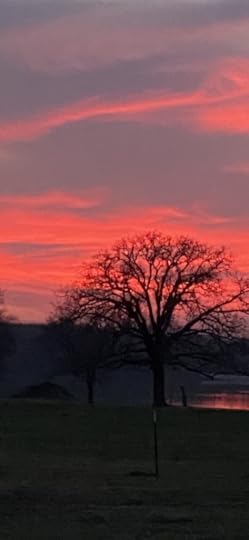
December 17, 2020
On the Brink of a New Year
Hello, Dear Readers. I’ve missed you.
Only two more weeks until we can drag the crumbling skeleton of 2020 out to the curb like a denuded, six-weeks-dead Christmas tree. But first we have to actually get through Christmas. Just . . . a little bit . . . longer . . .
Today I want to update you on a few writing-related matters. (And if you’ve read the newsletter that went out to everyone on Wednesday the 16th, there is only a little duplication in this blog post.) First, there’s good progress to report on Book 3 in the Space Between fantasy series. After setting aside the manuscript for several months, I finally took advantage of being mostly homebound and got back to work on it in late May. By mid-November I’d written another 50,000+ words, which means I’m about two-thirds of the way done. I’m taking another break—just a short one—over the holidays.
Next, ManyBooks, a website with an extensive library of classic and modern e-books, featured me as their Author of the Day on October 1st. The feature came with an interview, and I had great fun answering the questions posed by Content Editor Naomi Bolton. You can read the Q. & A. here. Her question about what to say to people who dismiss fantasy as pure escapism was especially welcome. It’s a matter about which I have strong feelings.
Last, I’m honored that a poem of mine appeared a few days ago on the wonderful site Your Daily Poem. Editor Jayne Jaudon Ferrer had published several of my poems a few years ago, and when she reached out and invited me to submit again, I was thrilled. It’s my first poetry submission anywhere in quite a while, and without her kind invitation, I wouldn’t be there now. You can read it here. (Another of my poems is scheduled to appear there in April.) While you’re on the site, be sure to browse the “Archives” page. Jayne has given a good home to a lot of fine poetry over the years.
The things mentioned above are fairly recent developments. That’s because in the first few months of the lockdown, my activities were limited to reading, sleeping and spending loads of time in the kitchen. Glen, however, was much more productive. As soon as we went into self-isolation, he returned to his creative first love, which is hand engraving. Take a look at the gorgeous work he did on this 1873 Winchester:

It’s just one of the pieces he turned out over the many hours I spent juicing yet another bag of lemons for cocktails (which I might argue was not really wasted time). He also produced a number of handsome money clips and stunning silver cuff bracelets. He seems to think it’s no big deal, but it always boggles my mind that I’m married to an artist.
And now, here we are at December 17th. So much water has swirled away under the bridge. Once we ring in 2021, maybe we can look forward to a shot (or two) in the arm so we can put—if nothing else—this virus behind us. I hope so. But for some of us who were held close in this intimate circle of readers, it’s too late for hope—and was too late even before March of 2020. For some time now there has been a widespread pattern of ill fortune and sadness. It shows no sign of ending yet. But those left behind keep going without their loved ones. Every day I think about you all, the living and the remembered. I marvel at your strength. I am blessed to have known you then, to know you today. Knowing you is what truly gives me hope.
Have a safe holiday season, everyone. And remember to keep your arms and legs inside the ride at all times. Seriously.
See you in 2021 . . .
April 16, 2020
Love in the Time of Coronavirus
Though it is claimed that there are now signs of marginal improvement in the fight against the novel coronavirus pandemic, the news is still so grim that I continue to distract myself with things that make me laugh. I’ve found that BuzzFeed is a good source for fun stuff, like photos of horrid Frankenstein food mash-ups (literally) that people have concocted while in self-isolation. This morning BuzzFeed showcased some tweets from people humorously bemoaning the way their relationships have careened downhill as they spend more time trapped at home with their partners. (Read them here.)
Some of these were hilarious. But when I stopped laughing and put down my phone, I reflected on how lucky Glen and I are to be self-isolating together. It’s not the first time I’ve thought about it in the month that we’ve been doing this, but today brought a new awareness. I realized that it feels almost as if we’ve spent our entire marriage self-isolating—over 36 years now—so much time have we spent secure in the bubble of our partnership. And I never want it to be otherwise.
I’ve written a number of poems celebrating our marriage, but my favorite is still the one below. I’d shared it with you all for Valentine’s Day several years ago, but it feels to me even more relevant now than it did then. The poem was first published on Jayne Jaudon Ferrer’s website, Your Daily Poem, on February 13th, 2014. It next appeared on March 25th, 2015, on A Year of Being Here, a site of daily mindfulness poetry curated by Phyllis Cole-Dai (now, alas, shut down). Then a few days ago, I was stunned and grateful to learn that the poem has appeared twice on “A Work Day in Hard Times,” a poetry blog from the University of Detroit Mercy, hosted by Fr. John Staudenmaier, S.J. On March 30, 2020, Fr. Staudenmaier re-posted his original remarks that accompanied the poem’s first appearance on his blog and then added this:
“This morning I searched the Poetry List, looking for a March poem that was posted so long ago, that it appeared to my eye and ear as fresh and new, full of surprises. Then too, the story Susan Rooke tells fits our present situation — love without showy extravagances- tender love — enduring love: a song of human intimacy.”
So now I offer this poem for everyone who, like me, has had a comforting, steadying hand to hold. To all of you, in love and gratitude, wherever you are—on this earthly plane, or transcendent on another—and to Glen, my one and only:
A Marriage in the Hands
You make a fist, that I might see
your skin grow tight again,
smoothed across your hand.
Those big hands that you like
to joke are too heavy when carried
all day at the ends of your arms.
Then you relax your hand,
and all the skin relaxes, letting
go the taut shine of youth,
and I see your sacrifice,
the thirty years you’ve held
us close, held my strength
for me, and all your tenderness.
I put my own hand out, relaxed,
palm down, next to yours.
You are aging, so am I, and this
is something we have sworn
always to do as one. Undeniably
I see we have. Then you make
a fist again. I make my own.
As one we smooth the way ahead.
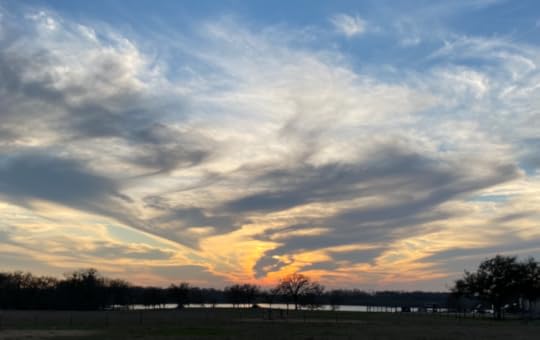
April 2, 2020
Distractions in the Time of Coronavirus
The world’s near-term prognosis is grim. As for the long-term, it doesn’t bear examining yet. Not by me, anyway. The last time I left the house to run errands without anxiety was March 11th. Two days later, Glen and I went into self-isolation. And now, along with lots of other people, I feel as if I’ve landed in a frightful alien landscape that bears no resemblance to my old way of life. To say the least, it’s concerning.
So, in an effort to stave off daily panic attacks, I’m trying to distract myself with:
1. Things that comfort me. Like baking bread and desserts, cooking, and spending time outside watching the cows and the birds. And with:
2. Things that make me laugh. Because there’s a lot to be said for laughter at a time like this. (Staying away from the latest news makes it easier.) It’s not about minimizing the severity of the pandemic. It’s about saving my sanity.
Some things in the second category:
• This evidence of The Daughter’s inexplicable need to put socks on a stuffed octopus
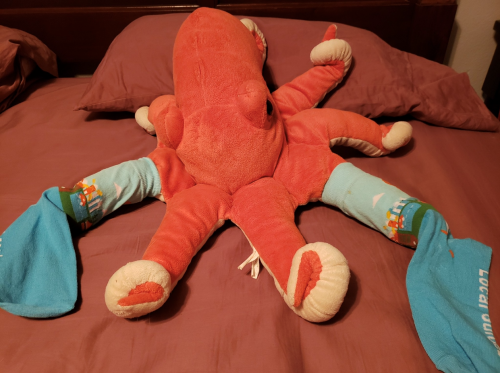
• The animated series, Simon’s Cat
• Old favorite movies, like Defending Your Life, or new ones, like Crazy Rich Asians
• Books by A.J. Jacobs, Mary Roach, David Sedaris and Peter Mayle, all writers who are humorous and suitably diverting in completely different ways
• The latest pics of The Granddog making himself at home on the furniture. (Those elegant ears! That aristocratic snout!) Navarre is a white German Shepherd, a mere puppy of 6 ½ months and 75 lbs. Someday when this is all over, Glen and I hope to meet him in person.
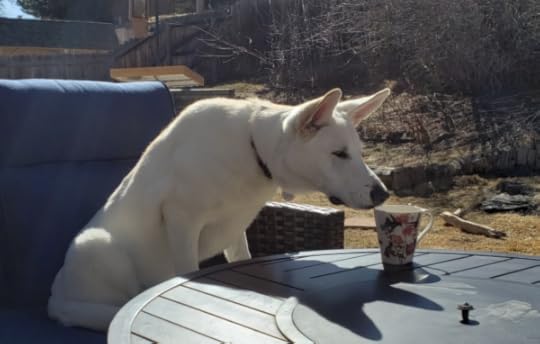
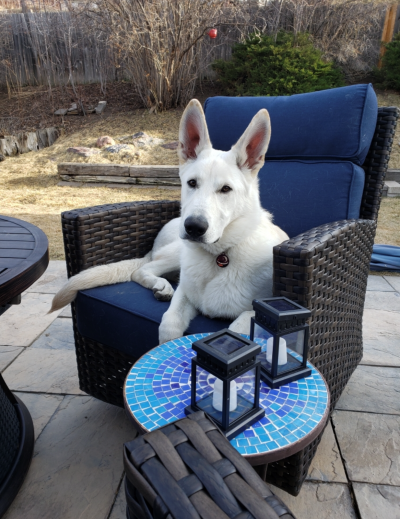
I wish I could say I’ve also distracted myself by writing, but the latest attempts to work on fiction and poetry have had no results. I can’t concentrate. But the other night when I awoke at 3 A.M. and all the doomsday scenarios started galloping through my thoughts, I began writing the lyrics to a song in my head. And though I’ve got only one verse and the chorus done so far, I’m pleased to say it’s already showing significant promise of being seriously awful.
[Verse 1]
Well, I went down to the grocery store,
took my place in line.
Stayed six feet from the guy before me,
six feet from the gal behind.
Didn’t need no toilet paper.
All I came for, all I came for . . .
was the wine.
[Chorus]
Now I’m stuck in isolation,
so much disaster on the news.
Can’t stop my mind from racin’.
Got the coronavirus blues.
I’m calling it—you guessed it—“Coronavirus Blues.”
All of you must have better ways to distract yourselves than writing the lyrics to bad songs. I would love for you to share them with me, please, because I really don’t want to spend any more time on the abomination above. There’s no big rush, though. Just whenever you get around to it. I’m gonna be hanging out here at the house for a while . . . washing my hands.
March 19, 2020
In a Pandemic, Hopes for the Future
Ready or not, once again history has caught us up in its riptide and carried us out to sea. I suppose I prefer witnessing history being made to the alternative of not witnessing it for whatever reason (being dead springs to mind), but I wish it didn’t strike so abruptly. Each day brings more shocking news and fresh worries. It makes me nostalgic for the overhyped, doomsaying days of Y2K. Because, regardless of what some people have been claiming (and as much as I’d like to believe it), I don’t think this coronavirus is being blown out of proportion. In fact, I’m not sure I’ve been worrying enough. And Glen, who exudes common sense and almost never shares my anxieties, agrees with me. So last week, after a few days of discussing the feasibility and making lists and plans, in the late afternoon of Friday, March 13th, we came home from a shopping trip and went into self-isolation.
Costco was the last stop on our pandemic-prep checklist that day, and the other errands had gone quickly and efficiently. We’d scored the groceries, the liquor and the pharmaceuticals that morning in the nearest small town with an H-E-B grocery, a Walgreens and a Twin Liquors. Yes, the H-E-B was very busy, but nothing like the Austin stores, whose barren shelves were being shown every evening on the news. So with those purchases made, we proceeded into the city.
I was giddy with relief at how easy the day was turning out to be, and even made some foolish remark about how Costco should be “a piece of cake.” After all, I babbled on, Costco’s a big store with plenty of everything! It wasn’t as if we needed much. We already had ample toilet paper and freezers stocked with food. It would be an adventure! Glen warned me that I was being too optimistic. I just laughed. And then we pulled into the Costco parking lot.
There were no spaces left. After circling the lot in futility, Glen drove to the outskirts and parked the truck against a curb. Then we went to join the river of humanity headed for the store’s entrance. Our “adventure” picked up speed when we passed a woman pushing a shopping basket full of food, paper goods and little children. She called to us over her shoulder, “They’re out of carts. You’ll have to get one in the parking lot!” Glen and I looked at each other. Uh-oh.
So Glen followed her to her car, helped unload her groceries while she did the kids, and then returned with her cart. We went into the store.
Much later, we emerged with most of the things we’d come for. No thanks to me, though. We’d been shopping for maybe fifteen minutes when we noticed that the glum-looking people at the end of the frozen vegetable aisle were leaning on their baskets, not shopping. Every so often, they all moved a few inches forward. Oh, dear God. It was the checkout line—a long, long line that snaked around the interior of the store. We’d already excused ourselves to pass through it several times on our way down the aisles, not paying much attention, not realizing what it was.
For a dumbfounded moment I stood open-mouthed, trying to comprehend the magnitude of it. What had happened to our short list of simple errands? The day had been going so well. We didn’t need this nonsense! Then I spiraled into a minor tantrum, insisting that we leave, and wasting valuable shopping time in the process. Glen was unmoved by my dramatics, and eventually I calmed down and we resumed shopping. (Later that day, over cheeseburgers and frozen margaritas—our last restaurant meal for the foreseeable future—he claimed he would have put me in the cart’s child seat if I’d misbehaved any longer. Knowing Glen, he would have.)
But by the time we took our own place in the Costco checkout line, my sense of humor was back and so was the spirit of adventure, which many of the pandemic preppers waiting with us seemed to share. Chatting and laughing with them made the time in line fly by. Surprisingly, it turned out to be fun.
I’m grateful we had that experience, ending the day on a good note of joking and camaraderie, enjoying the company of other human beings. Now it’s nearly a week later. We have all the time in the world, and no place to go. The news grows more alarming. Each day we hear of more closings and cancellations as retailers, schools, libraries, sporting events and municipal offices shut down. Television shows us empty restaurants and city streets that look like movie sets fallen into disuse. Always, there are deaths to report. Many people besides us are self-isolating, taking seriously the warnings that we must “flatten the curve.” Will it have the desired effect? Can we relieve what could otherwise turn into an insupportable burden on the U.S. health care system? Or will we end up like Italy? And then there’s the economy to worry about. The stock market’s cratering scares me more than the virus does.
A year or two from now, what kind of world will we wake up to? Those of us who are still here to wake? I hope with all my heart that Glen and I can wake up to the sight of each other, to our cows grazing in the pasture, to the knowledge that everyone dear to us came through the nightmare unscathed. I hope for the people who made our trip to Costco a little better, too. Starting with the woman who warned us about the lack of shopping carts. Once Glen had loaded her purchases into her car, she asked to know his name. This question, from a stranger in a meeting of mere moments, took him by surprise, but he told her. And she said, “Thank you, Glen.”
May all of you stay safe and well.
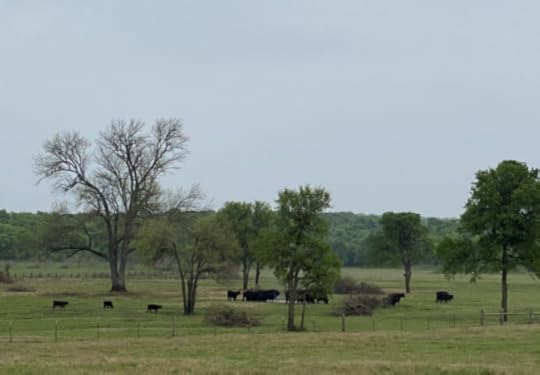
March 5, 2020
The Colonoscopy Diaries: Part 2
The day before, I had my nails done.
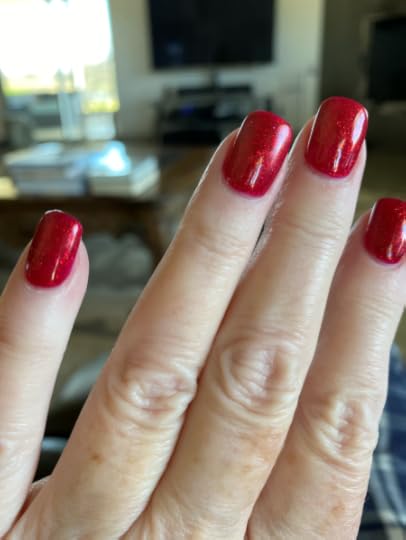
No one would be looking at my hands, but so what? I think it’s important to look nice for one’s colonoscopy.
The morning of, I put on a gift from The Daughter: my special socks.
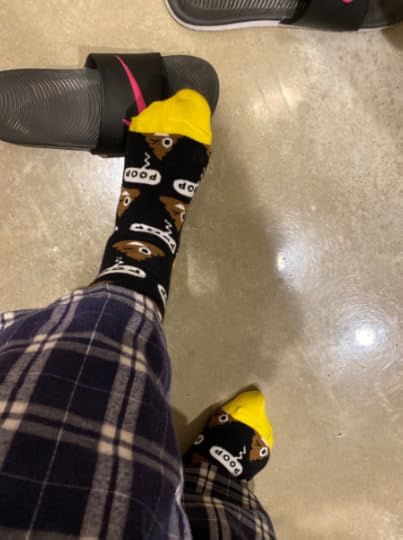
Then Glen and I made the pre-dawn trip into town. He drove while I prayed silently for a good result. One week later, I got the phone call from the gastroenterologist’s office that my prayers had been answered. What a relief, I don’t have to go back for five years! But I already knew there was something else I wouldn’t be going back for. Not in five years, or fifty-five.
In “The Colonoscopy Diaries: Part 1,” I wrote about a new type of prep called HyGIeaCare®. It sounds like a normal-ish sort of enema, possibly an appealing alternative to drinking large quantities of revolting fluids that can be hard for someone with a strong gag reflex to keep down. Like me. But after reading up on it, I wrote that I was going to do my prep the old-fashioned way. Revolting or not, drinking glup just seemed less . . . ew. After I wrote that post, however, a dear friend highly recommended the HyGIeaCare® method to me. That surprised me, so next I asked my gastroenterologist, who told me a member of her family had also preferred it to the standard prep. Two strong endorsements persuaded me, and I decided to give it a try. How bad could it be? Well . . .
There is a sterile nozzle, inserted. There follows a stream of warm water. That much I knew in advance. It was swiftly and professionally applied, with a minimum of fuss and embarrassment. That much I’d hoped for. So far, so good. What I was not prepared for was the quantity of water. Eight . . . gallons’ . . . worth. Eight. That’s one round. And if you can go for another round, for a total of sixteen gallons, all the better. I didn’t, but if you did, you’d have a colon so clean it squeaked.
Of course you can’t hold eight gallons of water, much less sixteen, all at once. No, indeed. Very soon after the ingress begins, so does the egress. And both processes keep going for what feels like forever. There’s a button you can push to stop the water streaming in if it becomes too much to bear. But there seems to be little benefit to that. You’re just dragging the process out. I stopped it once, for less than a minute. Even so, for a single round of eight gallons, I was in that small antechamber of Hell for about an hour and forty-five minutes. It seemed much longer. I had brought a book to help pass the time. I soon realized I couldn’t spare the attention to read it.
It was exhausting. Once it was finally over, though, I relaxed, thinking I was done. All I had left to do was link arms with Glen and stroll across the parking lot to the imaging center (conveniently close). I’d already done the hardest part. The colonoscopy itself would be a breeze!
But I was not done. And what happened next was even worse. It’s due largely to the fact that our colons have bends and turns, nooks and crannies. They are not, unfortunately, straight Teflon-lined tubes. When the technician came in to disengage the HyGIeaCare® apparatus, she told me to wait at least ten minutes before leaving my room. Why? Because, due to the aforementioned intricacies of human anatomy, not all of the eight gallons had found their way to the light again. “You’ll think it’s done, but it’s not,” she said. Are you KIDDING me? Until that moment, this was something I’d had no inkling of. No one had mentioned one word about this. And may I say that ten minutes was at least thirty minutes too short. I will leave it to you to envision all the inopportune moments that escaping water can choose to make its presence felt. Then, envision a few more. Luckily, they’re used to that sort of thing at the gastro imaging center. I hope.
It all worked out in the end (ha!), and it was a good learning experience. Obviously, there are people who find HyGIeaCare® very worthwhile. I’m just not one of them. But everything was better again once I came out from the colonoscopy. Under anesthesia, I’d had a dream, just as I had during my first one. Both had a fairytale theme. Seven years ago, I dreamed I had a goose that laid golden eggs. This time, I dreamed about a woodcutter who lived in a cottage in a magical forest. Whatever the Freudian significance, I enjoyed them.
And my special socks were a hit with the colonoscopy nurses.
February 20, 2020
Why I'll Never Win a National Book Award
We all know the caution about never saying “never,” but I’m going to defy that advice and state unequivocally that my novels have zero chance of winning a National Book Award. Ever. And what’s more, I’m fine with that.
My certainty stems from the fact that I spent the past few days reading Let the Great World Spin, a 2009 novel by Colum McCann. I picked it up at my nearest public library, and didn’t realize until I got it home that it had won the 2009 National Book Award for Fiction. That gave me pause, as I don’t read much literary fiction these days. I’ve reached the age when I read mostly for pleasure and not so much to broaden my horizons. Too often lit fic seems to dwell on (wallow in?) life’s more squalid aspects. I’ve seen squalor firsthand, thanks, and frankly, I don’t care to read about it. It leaves me depressed. But I saw the cover blurb from Dave Eggers (perhaps best known as the author of the 2000 memoir, A Heartbreaking Work of Staggering Genius), praising the novel’s “passion and humor and pure life force on every page.” And I thought, “Okay, then. How much of a downer could it possibly be?” So I cracked the book and started reading.
And oh, what a downer it was.
As the days passed and the pages turned, I could feel myself sinking deeper and deeper into a bog of despond. It didn’t take long for Glen to notice my mood and perhaps five seconds more to deduce the cause of it. Several times he urged me to return the book to the library unfinished, but each time I refused. Why? Was I enjoying it? Not one bit. But I couldn’t help admiring it. McCann is a brilliant writer.
He sets the book primarily in New York City; his focal point is high-wire artist Philippe Petit’s 1974 death-defying walk across the void between the Twin Towers of the World Trade Center, 110 stories in the air. Then McCann dips into and out of the lives of a number of major characters (including Petit), with sections of the book devoted to each character's point of view. He occupies their heads, peeling back the layers of personal history that make them the complicated, damaged people they are. Petit’s dangerous feat serves as the book’s extended metaphor: the characters are effectively 110 stories above the street, doing their best to edge along life’s high-wire and make it safely to the other side. But what their actions produce instead are the all-too-common tragedies of real life: arrests, car accidents, alcoholism and drug addiction, suicide, sons dying in war.
And of course as I read the book I was thinking also of the Twin Towers themselves, how they fell to ruin in 2001, and reflecting that none of us can reach the end of that metaphorical high-wire alive. When the book came out eleven years ago, its connection to 9/11 would have been even more painful, perhaps unbearably so for sensitive readers. (For a perceptive, beautifully expressed review, read Tom Junod’s July 2009 Esquire piece here.)
Well, finally I finished it, and I can’t tell you how relieved I was. And though it may not be as jaw-dropping as Philippe Petit’s daring stroll through thin air, Let the Great World Spin is an important novel by a writer of great skill, a high-wire act in its own right. I’m sure it deserved its National Book Award. But it’s also grim as hell. Not once in 368 pages did I smile at the “humor,” or thrill to the “passion” and “pure life force.” Instead, I read the whole thing with a frown and my lips pinched tightly together. Only briefly, near the end, did I feel a modicum of hope that a character’s fate might amount to something more pleasant than the literary fiction equivalent of “Life’s a bitch and then you die.” My hopes were left to wither, however, when very soon that character walked out of the book’s pages forever. Yes, just like people do in real life.
What I’m left with now—other than a determination to give it some time before reading literary fiction again—is a better sense of why I write what I do. Fantasy is genre fiction, and like all the rest of genre fiction, it’s often scorned by readers of “serious” books and viewed as pretty much the antithesis of the literary stuff. True, my characters must deal with violence and sadness and occasionally death. Some of them commit vile acts. Grim things sometimes happen. But that’s as close as my books get to the world we actually live in. Because here’s what I won’t do: I will not leave the characters I love stranded without hope for the future. To do that, I’d have to be stranded without hope myself. Call me sentimental, but that’s just how it is.
So, no. I’ll never win a National Book Award for Fiction. And I’m fine with that.
Why I’ll Never Win a National Book Award
We all know the caution about never saying “never,” but I’m going to defy that advice and state unequivocally that my novels have zero chance of winning a National Book Award. Ever. And what’s more, I’m fine with that.
My certainty stems from the fact that I spent the past few days reading Let the Great World Spin, a 2009 novel by Colum McCann. I picked it up at my nearest public library, and didn’t realize until I got it home that it had won the 2009 National Book Award for Fiction. That gave me pause, as I don’t read much literary fiction these days. I’ve reached the age when I read mostly for pleasure and not so much to broaden my horizons. Too often lit fic seems to dwell on (wallow in?) life’s more squalid aspects. I’ve seen squalor firsthand, thanks, and frankly, I don’t care to read about it. It leaves me depressed. But I saw the cover blurb from Dave Eggers (perhaps best known as the author of the 2000 memoir, A Heartbreaking Work of Staggering Genius), praising the novel’s “passion and humor and pure life force on every page.” And I thought, “Okay, then. How much of a downer could it possibly be?” So I cracked the book and started reading.
And oh, what a downer it was.
As the days passed and the pages turned, I could feel myself sinking deeper and deeper into a bog of despond. It didn’t take long for Glen to notice my mood and perhaps five seconds more to deduce the cause of it. Several times he urged me to return the book to the library unfinished, but each time I refused. Why? Was I enjoying it? Not one bit. But I couldn’t help admiring it. McCann is a brilliant writer.
He sets the book primarily in New York City; his focal point is high-wire artist Philippe Petit’s 1974 death-defying walk across the void between the Twin Towers of the World Trade Center, 110 stories in the air. Then McCann dips into and out of the lives of a number of major characters (including Petit), with sections of the book devoted to each character’s point of view. He occupies their heads, peeling back the layers of personal history that make them the complicated, damaged people they are. Petit’s dangerous feat serves as the book’s extended metaphor: the characters are effectively 110 stories above the street, doing their best to edge along life’s high-wire and make it safely to the other side. But what their actions produce instead are the all-too-common tragedies of real life: arrests, car accidents, alcoholism and drug addiction, suicide, sons dying in war.
And of course as I read the book I was thinking also of the Twin Towers themselves, how they fell to ruin in 2001, and reflecting that none of us can reach the end of that metaphorical high-wire alive. When the book came out eleven years ago, its connection to 9/11 would have been even more painful, perhaps unbearably so for sensitive readers. (For a perceptive, beautifully expressed review, read Tom Junod’s July 2009 Esquire piece here.)
Well, finally I finished it, and I can’t tell you how relieved I was. And though it may not be as jaw-dropping as Philippe Petit’s daring stroll through thin air, Let the Great World Spin is an important novel by a writer of great skill, a high-wire act in its own right. I’m sure it deserved its National Book Award. But it’s also grim as hell. Not once in 368 pages did I smile at the “humor,” or thrill to the “passion” and “pure life force.” Instead, I read the whole thing with a frown and my lips pinched tightly together. Only briefly, near the end, did I feel a modicum of hope that a character’s fate might amount to something more pleasant than the literary fiction equivalent of “Life’s a bitch and then you die.” My hopes were left to wither, however, when very soon that character walked out of the book’s pages forever. Yes, just like people do in real life.
What I’m left with now—other than a determination to give it some time before reading literary fiction again—is a better sense of why I write what I do. Fantasy is genre fiction, and like all the rest of genre fiction, it’s often scorned by readers of “serious” books and viewed as pretty much the antithesis of the literary stuff. True, my characters must deal with violence and sadness and occasionally death. Some of them commit vile acts. Grim things sometimes happen. But that’s as close as my books get to the world we actually live in. Because here’s what I won’t do: I will not leave the characters I love stranded without hope for the future. To do that, I’d have to be stranded without hope myself. Call me sentimental, but that’s just how it is.
So, no. I’ll never win a National Book Award for Fiction. And I’m fine with that.



